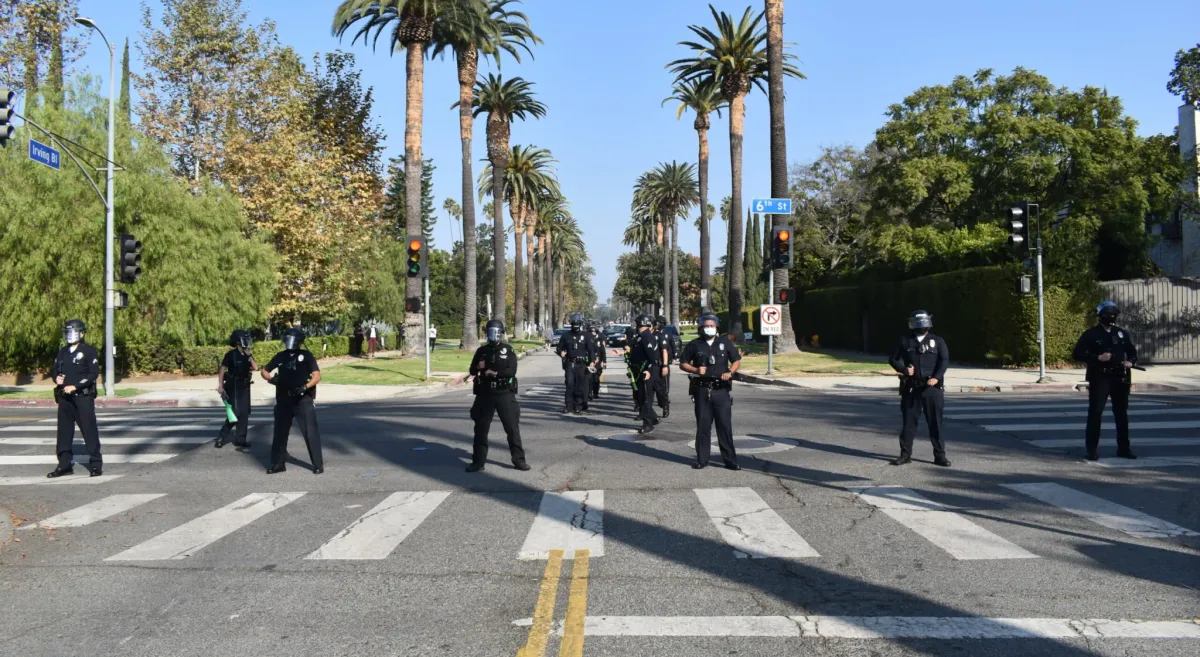
The Los Angeles Police Department has denied at least 13 similar requests this year.
Knock LA and the First Amendment Coalition are suing the Los Angeles Police Department for failing to release body camera footage of its officers brutalizing protesters outside of Los Angeles Mayor Eric Garcetti’s house on December 6, 2020.
In the lawsuit, Knock LA and FAC allege that LAPD’s failure to release footage for a California Public Records Act (CPRA) request violates a state body camera transparency law. The legislation requires law enforcement agencies to disclose audio and video records of “critical incidents,” which means any incident that includes a use of force that caused a “great bodily injury.”
The lawsuit requests that the Los Angeles Superior Court require LAPD to disclose the footage to Knock LA and FAC.
“This is very suspicious because the LAPD keeps changing its story on why it won’t release these tapes more than one year after the attack,” said Susan E. Seager, director of UC Irvine School of Law’s Press Freedom Project, which brought suit on behalf of FAC and Knock LA. “Why are Chief Michel Moore and the LAPD trying to block the public from seeing officers club nonviolent protesters outside the mayor’s home?”
Cerise Castle, the journalist who initially requested the footage, said in a statement: “Once again, an agency of the city of Los Angeles is refusing to provide records that state law has defined as accessible to the public. The city knows there is no agency tasked with ensuring compliance. Once again, we are forced to sue to do our jobs and give the public transparency. It begs the questions — what are they trying to hide, and for whose benefit?”
Civil rights attorney Shakeer Rahman says LAPD’s body camera program is almost exclusively a tool for propaganda and surveillance. “Even when LAPD brutalizes protesters in broad daylight, they are claiming they can keep the footage secret. This case could resolve the important legal question of whether LAPD can continue suppressing body camera footage of its violence.”
LAPD has denied at least 13 requests this year, according to a Knock LA analysis. Police officers continue to commit violence upon protesters, even though they know that they’re being recorded – on June 24, LAPD brutalized abortion rights protesters.
“When officers hurt people, the public has a right to the full story, not just the police department’s spin,” said David Loy, legal director of the First Amendment Coalition. “LAPD’s stonewalling is just one example of statewide resistance to police transparency.”
There is no enforcement tool that the public can use to force an agency to disclose records that are legally required to be released. This leaves journalists and the public with only one option to get the information: sue the public agencies. This puts the public and journalists, who often do not have the resources to sue over records, at a disadvantage when it comes to obtaining information that can be crucial to understanding what is happening to people engaged in First Amendment–protected activities.
Correction: An earlier version of this article referred to Shakeer Rahman as a First Amendment attorney. He is a civil rights attorney.
